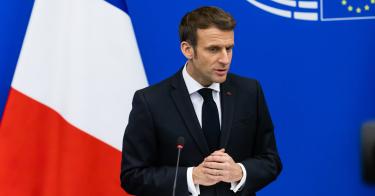A big question mark hangs over transatlantic relations: the upcoming French presidential elections. Both the far-left and ultra-conservative French presidential candidates hold deeply disturbing positions on Russia and NATO, and the incumbent, President Emmanuel Macron, is anything but reliable on these crucial issues. With the Ukraine crisis already showing cracks in European solidarity, it is hard to envision an election outcome where France makes the challenge of keeping a Europe “whole, free and at peace” any easier.
The first round of presidential elections in France is scheduled for April 10. Despite significant disapproval ratings in recent polls, Mr. Macron remains the strongest candidate. He will likely lead the first round with 25% of the vote. Estimates are he would win the second round by more than 50%.
Opposition from the right is led by Marine Le Pen, the nationalist leader of the National Rally. In recent polls she is at 16%. The center-right candidate of The Republicans, Valerie Pecresse is also at 16%. Three points behind is the ultraconservative polemicist Eric Zemmour.
Left-wing candidates lag further behind. The leader of La France Insoumise, Jean-Luc Melenchon, is at 10%, followed by the socialist mayor of Paris, Anne Hidalgo, at 3%.
>>> The U.S. and France Should Double Down on Security Cooperation in the Indo-Pacific
If the election were held today, the only candidates who could challenge Mr. Macron in the second round would be Ms. Le Pen and Mrs. Pecresse.
The campaigns have focused mainly on domestic policy. That said, the candidates are also fighting on international issues, starting with the relations between Paris and Brussels. While no longer supporting France’s exit from the European Union, Ms. Le Pen is proposing a drastic reform of the EU, with the aim of significantly strengthening French national sovereignty.
Ms. Pecresse, for her part, calls for stricter rules on illegal immigration at European level. Mr. Zemmour and Mr. Melenchon hold even harsher positions toward Brussels on a range of issues.
Mr. Macron aims to present himself as the most pro-EU candidate. That is a half-truth. Mr. Macron has often disavowed his self-proclaimed Europeanism in recent years. His goal has always been to make France a politically hegemonic country in the EU, taking advantage of Brexit and of former German Chancellor Angela Merkel’s recent departure from the political scene.
The candidates also split on NATO, where views run to the extremes. “It is my constant position, I think that we have nothing to do in this military alliance,” Mr. Melenchon said last September, receiving full support from Mr. Zemmour.
Meanwhile, Ms. Le Pen recently tweeted, “I want to get France out of NATO’s integrated command.” She is also in favor of Russian President Vladimir Putin. A few weeks ago, she declared, “You can say whatever you want, but Ukraine belongs to Russia’s sphere of influence.”
Mrs. Pecresse, on the other hand, said France should not abandon NATO’s integrated command structure.
Mr. Macron has been more ambiguous. In 2019, he famously described NATO as “brain dead,” but other than name-calling, he has done little to undermine the alliance. Recently, he called for separate European negotiations with Russia over Ukraine outside of NATO. This proposal garnered no support, sparking comments that it was more for domestic posturing than a serious suggestion.
>>> In France and the U.S., a Tale of 2 Energy Policies
None of the main French presidential candidates has talked much about China at all, despite the fact that the French parliament recently passed a resolution recognizing the treatment of Uyghurs in the Xinjiang region as “genocide.”
The most likely outcome is that Mr. Macron will be back continuing his call for European strategic autonomy, a movement so far that has done more to divide than unite Europeans who see Mr. Macron’s cry as little more than a power grab for Paris. Mrs. Pecresse might make it through to the second round, although it is not yet clear whether she will be able to bring together the various souls of French conservatism and thus effectively challenge the incumbent president, nor, if she won, that she could drive support for a strong transatlantic policy.
Regardless of the outcome, the U.S. can’t depend on serious French help for building transatlantic solidarity. And with Biden’s record on leadership in the community in a serious slump, that’s a problem. At best, the French elections look to leave the transatlantic partnership continuing to muddle through under mediocre leadership.
This piece originally appeared in The Washington Times




